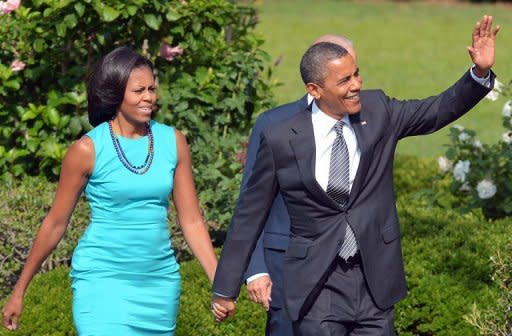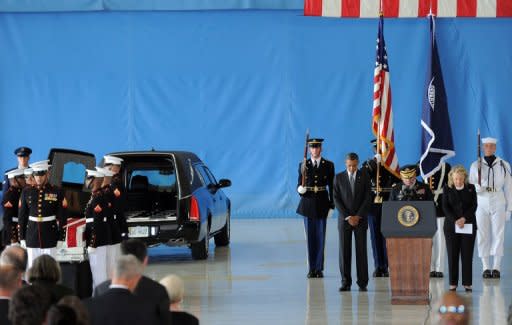White House race nudges toward Obama
President Barack Obama has carved out a clear advantage in the White House race even as he juggles the demands of his re-election campaign with managing a raging Middle East crisis. Obama appears to be enjoying a resilient bounce following the Democratic National Convention nearly two weeks ago, while his Republican challenger Mitt Romney has struggled to land telling blows. The US leader has a small but definite advantage in most national polls of the race to the November 6 election, and more importantly looks strong in swing states that will decide whether he wins a second term. But while he has benefited from the advantages of incumbency, including an ability to appear statesmanlike, Obama could also experience its downside if anti-US feeling racing through the Muslim world takes another deadly turn. So far, Obama appears to have avoided missteps following the deaths of four Americans, including the US ambassador to Libya, that would erode his national security edge over Romney. The president was up 10 points over his rival when voters were asked before the crisis whom they trust more to steer foreign policy, in a CBS/New York Times poll. Obama's campaign team would welcome an election fought over the more friendly terrain of national security, rather than the tepid economy. But with Americans, including diplomats and Marines sent to protect them, vulnerable in the Arab world, Obama cannot yet afford to breathe easy. "If this mushrooms and goes on, and we're seeing people attacking US interests, then yes, it would raise foreign policy on the agenda of the election," said Michele Dunne, director of the Rafik Hariri Center for the Middle East at the Atlantic Council. But Dunne added that even if unrest in North Africa and elsewhere went on, it was unlikely to trump the economy as the dominant issue of the election. In recent days, Obama has repeatedly been called upon to handle the threats to US targets in Yemen, Sudan, Egypt, Libya and elsewhere, with one eye on his political prospects. On Friday, he officiated in the return of the American dead from Libya, then nipped out of the White House for meetings with his campaign team and a big-money fundraiser in Washington. Obama also managed to make trips last week to swing states Nevada and Colorado, with visits to Ohio, Florida, Wisconsin and Virginia on deck. Eight weeks before the election and three weeks before the first of three presidential debates with Romney, Obama appears well placed. In Gallup's daily tracking poll Saturday, Obama was up 49 percent to 45 percent on Romney, and in the RealClearPolitics average of national polls, he was up three percent on the Republican. In Wall Street Journal/NBC/Marist College polls, Obama led Romney 49 percent to 44 percent in Florida, 50 percent to 43 percent in Ohio and 49 to 44 percent in Virginia. Should Obama duplicate that performance in November, he would easily capture the required 270 electoral votes. In fact, the president was leading in nine out of 10 opinion surveys showcased Sunday by RealClearPolitics.com. Only a Rasmussen tracking poll gave Romney a slight two-point advantage. Obama also erased the edge on the economy -- the top election issue that Romney formerly enjoyed -- despite disappointing jobs data last week and an unemployment rate of 8.1 percent. In the New York Times poll, 47 percent of voters thought Obama would be better at handling the economy and jobs, while 46 percent picked Romney. Most analysts expect the race to close somewhat as the glow from the Democratic convention fades. And a disastrous jobs report in early October could put Obama under renewed pressure. Obama aides believe it will be another week before a true picture of the race settles -- but are encouraged by battleground state data. Republicans are, publicly at least, not panicking. Romney pollster Neil Newhouse last week dismissed Obama's spurt as a "sugar high." Republican National Committee communications director Sean Spicer meanwhile predicted in a memo on Friday that Romney's position would improve as more voters see a "clear and critical difference" in the rivals' economic plans. But Romney has struggled to assert himself since he owned the spotlight at his Florida convention in August. His hair-trigger criticism of Obama as sympathizing with protestors who invaded the US embassy in Cairo prompted Obama to label him a "shoot first, aim later" candidate, and undermined foreign policy credentials tarnished by an error-strewn trip abroad. Critics have questioned Romney's decision to appear on a soft-focus daytime chat show Friday, addressing trivial issues like what he wears to bed each night instead of focusing on the Middle East. "I'm kind of a Snooki fan," Romney said, referring to Nicole "Snooki" Polizzi, star of MTV reality show "Jersey Shore." Romney's segment, set to air Tuesday, was part of his effort to show a more personable side to female voters, who polls show strongly favor Obama. Romney's tone jarred with the somber mood of a day on which the bodies of the four dead Americans returned home in a heart-rending ceremony. US President Barack Obama, First Lady Michelle Obama and Vice President Joe Biden arrive for a ceremony to honor the 2012 US Olympic and Paralympic teams on the South Lawn of the White House, September 14. Obama has carved out a clear advantage in the White House race even as he juggles the demands of his re-election campaign with managing a raging Middle East crisis US President Barack Obama and Secretary of State Hillary Clinton bow during a ceremony marking the return of the remains of four Americans killed in Benghazi, Libya, at Andrews Air Force Base in Maryland, September 14. Obama has carved out a clear advantage in the White House race even as he juggles the demands of his re-election campaign with managing a raging Middle East crisis. US Republican presidential candidate Mitt Romney poses for photos with young soccer players after watching one of his grandsons play in Belmont, Massachusetts, on September 15. President Barack Obama has carved out a clear advantage in the White House race even as he juggles the demands of his re-election campaign with managing a raging Middle East crisis.


